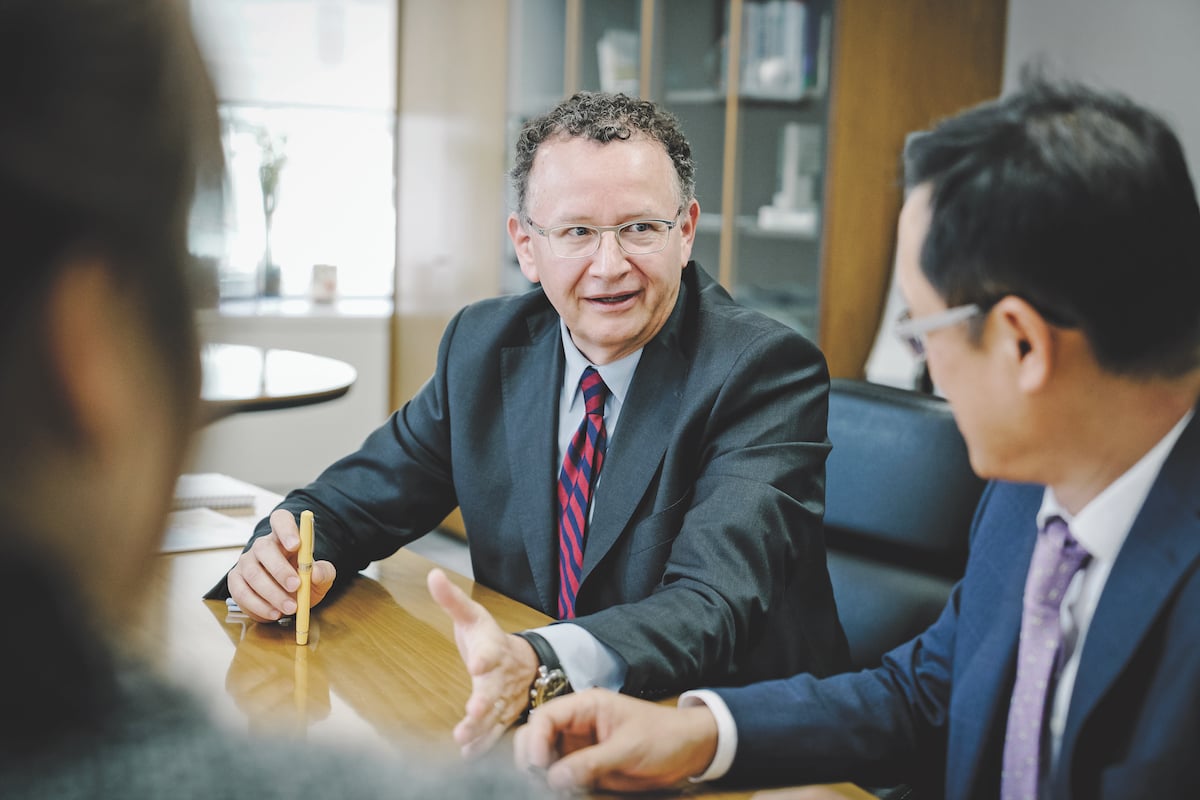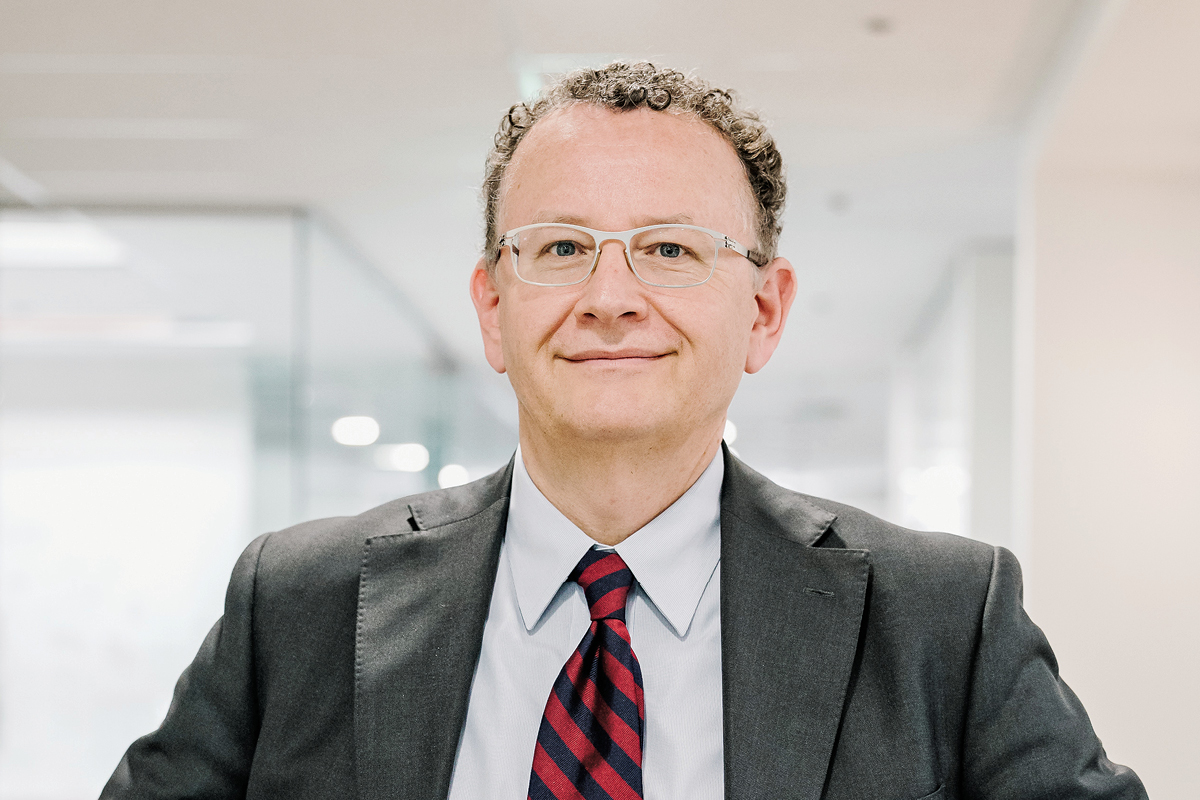From the chair in the boardroom to the plastic stationery scattered around your desk, the bumper of your car, and the container in which you store and reheat your food – even the shoes you wear on your feet and the carpet you walk on – the point is an obvious one: Polypropylene is everywhere. Each day, it serves as your crucial yet silent partner in life, and without it civilisation could be at quite a loss. So why don’t we know more about it?
“I think each one of us, every day, touches and uses between 10 and 20 different components or items made from polypropylene without realising,” says Martino Gabellich, CEO of South Korean polypropylene manufacturer PolyMirae. “People just don’t know that it’s such a big part of our life, and contributes a lot to our quality of life.”
Martino Gabellich knows his plastics
A popular and versatile thermoplastic polymer material, polypropylene appears as any variety of plastic or fibre, except for the added benefit of chemical resistance, elasticity and toughness, able to withstand high temperatures and to keep for a long time without any risk of mould or bacteria – making it perfect for food storage, house cleaning materials, and on the list goes.
Each one of us, every day, touches and uses between 10 and 20 different components or items made from polypropylene without realising.
Polypropylene manufacturers have certainly not been negatively affected by the widespread ignorance of its prevalence, however, with the global market expected to reach US$124 billion within two years, growing at a CAGR of 6.3% from 2013 to 2019, according to Transparency Market Research.
It’s a product for which demand has grown rapidly since it was first discovered in 1954 by a chemist duo from Germany and Italy, Karl Ziegler and Giulio Natta, and then commercialised three years later, with Natta synthesising the first isotactic polypropylene. Today, another Italian chemical expert, the Milan-born Martino, began his career after graduating from a Masters in Chemical Engineering, followed by a Masters in Business Administration at the Politecnico di Milano.

“My background is quite diverse. I started working in 1989 and I have done many different jobs since then. I’ve had the opportunity to work across numerous roles and companies, in five different countries across Europe, South America and Asia, but my focus has always been in the chemical industry,” says Martino. “In terms of functions, I’ve worked in marketing and sales, as well as new business development. I have also worked in both business management and general management. Before taking this new assignment with PolyMirae, I spent a good period in research and development, which I found very interesting,” he adds.
A Korean culture shock
After more than 10 years working for global chemicals and plastics leader LyondellBasell, Martino was appointed CEO of PolyMirae in 2016 to help spearhead the growth of the relatively young chemicals player – born of a joint venture in 2000 between LyondellBasell and Korean petrochemical outfit Daelim Industrial Company.
The company works across all fields of the polypropylene sector, from marketing and sales all the way to production. Its manufacturing site in Yeosu, South Korea, produces 700,000 tons of polypropylene per year, with the end commodity being tailor-made in more than 100 different products.
Coming from such a multicultural background has really helped to shape my management style, because being exposed to different cultures is very important for my personal and professional development.
Despite his proven partiality to new cultural experiences, Martino says joining a Korean firm direct from Italy was a challenge, but he has managed to adapt his management style for a faster and more effective decision-making process. “Coming from such a multicultural background has really helped to shape my management style, because being exposed to different cultures is very important for my personal and professional development. Korean culture is quite different to European or American culture, though, so there are quite a few challenges, especially for me since I don’t yet speak the language,” laughs Martino.
“It is very different and not an easy language to pick up. But there are quite a few elements that are very positive as well. The Korean approach to things is highly organised. “It is typically a group approach, so I tend to feel more like I’m part of a team in areas like business management, building customer relationships, and implementing specific strategies.”
Martino also praises Korea as a great base for scientific learning and research – a quality likely to come in handy for a business with a strong chemistry component.
PolyMirae provides a diverse but customised product portfolio
Like most companies, PolyMirae’s main goal for the next few years is growth, though it has a strong global foundation upon which to build the business. It relies heavily on exports, with its diverse product portfolio serving more than 40 countries, over five continents. “We have quite a global customer footprint, and this is unique,” says Martino. “Basically 50% of our product is used domestically in the Korean market, and we sell the other 50% globally.”
We can capture each unique segment by carefully catering to the requirement of each specific application. That is the secret.
While the global polypropylene manufacturers market is quite a saturated one, Martino says, a key pillar for PolyMirae is the diversity of its product portfolio, with the company growing to cater to a number of needs across numerous sectors. “The plastics industry comes with high volatility; raw materials always do. This is why it is so important for us to make our business resilient and more diverse in terms of our product, market segments, and geographies.”
Rather than falling into the mentality of ‘jack of all trades, master of none’, PolyMirae’s diversity maintains a specific focus on highly customised solutions across the food packaging, textiles, automotive sector, toiletries and detergents, and houseware and appliances. “These are all very different applications, but we can capture each unique segment by carefully catering to the requirement of each specific application. That’s the secret,” says Martino.
“We leverage technology to tailor-make our products with the perfect recipe to give our customers the best result. With this, we are enjoying outstanding growth with some of our key customers, and that’s the reason behind our success.”
Projected growth
Being a very light and durable material, polypropylene sees great demand from the automotive industry. “Each car today requires around 60 kilograms of polypropylene,” says Martino. “PolyMirae is part of the automotive value chain; we supply our raw materials to companies who then tailor-make the final product to sell to the OEMs.”
Further, the growing demand for electric cars brings extended opportunities for polypropylene, because the lithium-ion batteries used typically come encased in a polypropylene and polyethylene film. PolyMirae is working to cope with the International Energy Agency (IEA) forecast that 30 million electric cars will be on the road in 2025.

